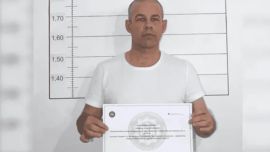The trickle of Venezuelans crossing into Peru from Chile is triggering a political furor and a border crackdown – a sign that authorities fear it’s the start of a flood out of Latin America’s most anti-immigrant country.
It all started last week when Chile’s presidential frontrunner, José Antonio Kast, visited the desert border and issued a warning to undocumented migrants: leave in the next few months or be expelled.
“If you don’t go on your own, we’ll detain you, we’ll expel you, and you’ll leave with only the clothes on your back,” he said on November 20.
Within days, the Peruvian press was interviewing migrants heading north across the border. Many were Venezuelans, part of the eight million exodus that has spread out across Latin America since the economic collapse under the government of President Nicolás Maduro. They now fear expulsion from one of Latin America’s wealthiest nations.
“What we want is to go back to Venezuela,” one woman told Peruvian local media. “I’d rather leave on my own terms than wait for them to win – and then what? They’ll throw us in jail,” said another.
The press reports were enough for Peru President José Jerí to announce plans to declare a state of emergency in the region, traveling to the border city of Tacna on Noember 23 to inspect security operations along the Chilean frontier.
It’s an indication of things to come as Chileans prepare to go to the polls on Dec. 14 in a presidential runoff between the ultra-conservative Kast and Jeannette Jara, the communist candidate for a coalition of center-left parties.
“It’s important to start looking at the regional impact of an announcement like this, because it has already triggered a reaction in Peru, it’s going to have one in Bolivia, and if they go to Argentina, it will have an impact in Argentina as well,” said Nicolás Zevallos, director of the Institute of Criminology of Peru.
Promises, promises
Kast has promised Chile’s toughest-ever crackdown on migration, claiming his policies would prompt a greater percentage of undocumented migrants to leave voluntarily than under Donald Trump in the United States. He’s also called for classifying irregular migration as a crime.
And his rhetoric is being reflected across the border in Peru.
When asked whether his move was a reaction to Kast’s comments, Jerí said it was a response that should have come long ago from the State, to protect the country’s borders and reassert authority.
“What matters now is that we need to activate a plan and apply it across all our borders,” he said.
Chile has attracted hundreds of thousands of immigrants in the last few decades, first from Peru, then Haiti and more recently from Colombia and Venezuela, drawn by its economic stability. Chile is home to about 665,000 Venezuelans, compared with around 1.66 million in Peru, according to the UNHCR. Many Chileans associate the influx with rising crime.
Roughly 92 percent of Chileans favour stricter immigration policies, far more than in other major economies in the region, according to LatAm Pulse, a survey conducted in October by AtlasIntel for Bloomberg News. Tapping into growing public frustration, Kast has cast irregular migration as a national security threat, making it a centerpiece of his campaign.
The strategy appears to be paying off: he finished a close second in the first round, winning 23.9 percent of the vote to Jara’s 26.9 percent. He is now the firm favourite for the run-off.
Zevallos warns this move could have repercussions far beyond the frontier. “What usually happens with these harsher border speeches is that criminal networks do better business. Why? Because they find in desperate people a way to move them from one place to another,” he said.
After Jerí announced he would militarize the border with Chile, Kast urged President Gabriel Boric to travel to Arica, the city at the country’s northernmost edge.
Kast said that while Peru’s move couldn’t have been anticipated, the situation now demands that Boric step up and take responsibility.
Diego Paco, governor of the Arica and Parinacota Region, echoed the call to Boric on Tuesday.
That same day, Arica Mayor Orlando Vargas told CNN Chile Radio that Peru’s decision to militarise its border would create a “plug” of migrants stranded on the Chilean side, forcing the municipality to assist them.
He went on to say Chile’s immigration laws were too soft and made a warning to the authorities in Santiago.
“A chaos is going to be created and camps are going to be created at the border,” he said.
by Antonia Mufarech, Bloomberg
























Comments